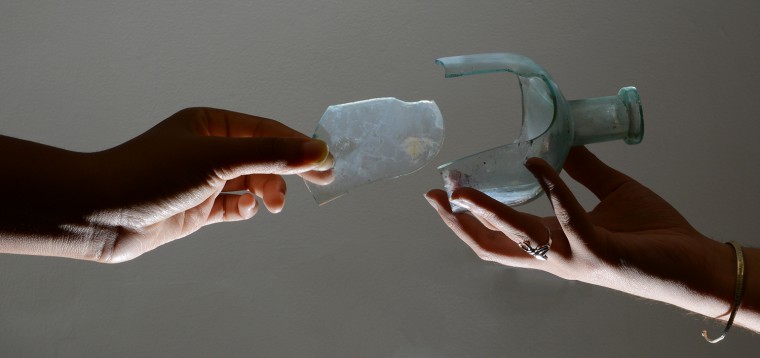Many people think of archaeology as taking place in exotic locations overseas, not in their own backyard. Yet archaeology projects are continuously being carried out all over the state of Connecticut. On Oct. 18, Wesleyan’s Archaeology Program and Office of Community Partnerships will present the Connecticut State Archaeology Fair to give the public a close-up look at some of these projects. Part of Archaeology Awareness Month in October, the fair will feature many hands-on exhibits and activities for adults and kids. Presenters will represent a full spectrum of archaeology in the state, ranging from local tribes and community groups to…
Learn more about Professor Croucher's research in this past Wesleyan Connection article or in this video. (Photos by Ryan Heffernan '16)
Students enrolled in the June Summer Session course, Field Methods in Archaeology, participated in several excavations on the triangle of land between Vine Street, Cross Street, and Knowles Avenue, known as the Beman Triangle. Several African-Americans built homes and lived in this area in mid-19th century. Although few above-ground traces now suggest the presence of this community, material about their lives survives in the record of their trash and other archaeological features that remain beneath the backyards of the houses on this land. The course is taught by Sarah Croucher, assistant professor of anthropology, assistant professor of archeology, and provides…
Between Vine Street, Cross Street and Knowles Avenue near Wesleyan, an innocuous looking triangle of land forms the “Leverett Beman Historic District,” listed on the State Register of Historic Places and part of the Connecticut Freedom Trail. This area is the site of one of the earliest planned African American communities in the United States. During the spring of 2012, Sarah Croucher, assistant professor of anthropology, assistant professor of archaeology, led an archeological excavation at the "Beman Triangle" site. Several Wesleyan students and community members participated in the dig and unearthed dozens of materials relating to healthcare and everyday practices,…
In this video, Sarah Croucher, assistant professor of anthropology, assistant professor of archaeology, discusses her community archaeology project in the "Beman Triangle" in Middletown, Conn. The houses built on this land from the 1840s were home to a community of African Americans living in Middletown, tied to the nearby A.M.E. Zion Church. Artifacts discovered in the area from 19th century trash pits shed new light on the lives of the community members, and the longstanding relationship between the church, Middletown and Wesleyan. Read more about Croucher's project in this past Wesleyan Connection article. #THISISWHY [youtube width="640" height="420"]http://www.youtube.com/watch?v=ty_fiNkNdtg[/youtube]
In this issue of The Wesleyan Connection, we ask 5 Questions of Sarah Croucher, assistant professor of anthropology, assistant professor of archaeology, assistant professor of feminist, gender, and sexuality studies. Croucher will lead an archaeological dig on the site of the Beman Triangle in Middletown on April 28-29. The public is welcome to attend. To view photos of the dig on April 14-15 click here. Q: Professor Croucher, what exactly is the Beman Triangle and what is its significance to the history of Middletown? A: The Beman Triangle is the land between Vine Street, Cross Street, and Knowles Ave., where…
(more…)
In an episode of WNPR’s “Where We Live,” Sarah Croucher, assistant professor anthropology, assistant professor archeology, discusses the upcoming dig at Beman Triangle, a site in Middletown, Conn. that was the center of the city’s African American community in the 19th and early 20th century.
Sarah Croucher co-edited the book, The Archaeology of Capitalism in Colonial Contexts, published in 2011. Croucher is assistant professor of anthropology, assistant professor of archeology, assistant professor of feminist, gender and sexuality studies. The Archaeology of Capitalism in Colonial Contexts: Postcolonial Historical Archaeologies explores the complex interplay of colonial and capital formations throughout the modern world. The authors present a critical approach to this topic, trying to shift discourses in the theoretical framework of historical archaeology of capitalism and colonialism through the use of postcolonial theory. This work does not suggest a new theoretical framework as such, but rather suggests…
As an archaeologist investigating 19th century sites in Zanzibar and Tanzania, it was impossible for Sarah Croucher to ignore the thousands of shreds of locally-produced and imported ceramics unearthed every day of excavations. For archaeologists, these materials are vital to interpreting the social history of 19th century Islamic colonialism in East Africa. "Many key questions remain uninvestigated, particularly in regard to how newly shared Zanzibar identities emerged during the 19th Century, which intersected with gender, religion, class and sexuality," Croucher explains. Croucher, assistant professor of anthropology, assistant professor of archaeology, assistant professor of feminist, gender and sexuality studies, has been…
In Introduction to Archaeology, all students were trash-talking their first assignment. Titled "Understanding Garbage - Research and Analysis," the laboratory project helped students understand ways archeologists collect and analyze data by rummaging through rubbish and taking note of their findings. (more…)


